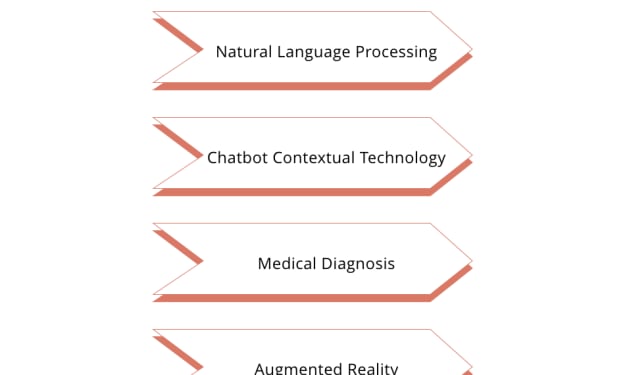Investigate the ethics and moral implications of artificial intelligence | According to AI
Answering Vocal's Writing Prompts with AI. In this post, we discuss the topic: 'Investigate the ethics and moral implications of artificial intelligence.'

With the release of Vocals new "400 Creative Writing Prompts to Spark Your Imagination on Vocal" post we couldn't help but to see what our AI has to say. In this post we will be exploring the Vocal Prompt: Investigate the ethics and moral implications of artificial intelligence.
-David
This post was created with the support of OpenAI.
Artificial intelligence (AI) has come a long way since its inception, raising numerous ethical and moral questions about its implementation. The exponential growth in the field of AI has given us access to a plethora of data and machines that can now do things that were once thought to be impossible. With AI's growth, it has raised numerous ethical and moral questions that have left many people wondering about its implications. In this blog, we will be diving deep into the ethical and moral implications of AI and why it matters.
The development of AI has led to an increasing concern about its impact on employment. With AI's growth, it could replace many jobs, leading to a massive loss of employment opportunities for people. This could be a significant challenge for society to solve, and it requires careful consideration of the ethics of AI. It is important to note that AI will also create new jobs in various fields, including data science, programming, and machine learning. However, the challenge will be ensuring people have the skills to transition into these new jobs.
One of the ethical concerns about AI is the issue of bias. AI is trained on data that is generated by humans, and sometimes, this data can be biased. For instance, if an AI algorithm is trained to identify criminals, and the data used to train the algorithm has a bias against a particular race or gender, the algorithm will also be biased. This can lead to a situation where people are unfairly targeted, which is a significant concern. Biased algorithms can also lead to a lack of diversity in decision-making, limiting innovation and exacerbating inequality.
Another issue that arises with AI is the question of privacy. With the use of AI, personal data is being collected at an unprecedented rate. This has raised concerns about how this data is being used and who has access to it. The potential for misuse of this data is a significant ethical concern. For example, the use of facial recognition technology by law enforcement agencies raises concerns about privacy violations and the possibility of unfairly targeting specific groups. It is essential to develop regulations and guidelines to protect individual privacy and ensure that AI is used ethically.
The development of autonomous weapons is another significant moral implication of AI. With the development of AI, there is a possibility that we could create weapons that could make decisions on their own. This would be a significant concern as it could lead to a situation where machines make decisions about who lives and who dies. The development of autonomous weapons also raises questions about accountability and responsibility. Who would be held responsible if an autonomous weapon causes harm? This is a complex issue that requires careful consideration by policymakers and international bodies.
Another moral implication of AI is the impact it could have on our social fabric. AI has the potential to exacerbate existing social and economic inequalities. For example, AI-powered recruitment systems may use biased data to screen out job applicants from underrepresented groups. This can reinforce existing inequalities in the workforce and limit opportunities for specific groups. AI may also be used to manipulate people's behaviour, opinions, and beliefs, which could undermine the principles of democracy and free speech. It is essential to develop ethical guidelines for using AI to ensure that it does not undermine our social fabric.
In addition to AI's ethical and moral implications, there are also significant technical challenges to consider. One of the most significant challenges is the development of explainable AI. Explainable AI refers to AI systems that can explain how they arrived at a particular decision or recommendation. This is important to build trust in AI systems and ensure they are used ethically. Explainable AI is also crucial for identifying and addressing bias in AI systems. Developing explainable AI requires significant investment in research and development and collaboration between researchers, policymakers, and industry stakeholders.
Another technical Challenge to consider is the issue of safety. As AI systems become more complex and integrated into our daily lives, ensuring their safety becomes increasingly important. AI systems that control critical infrastructure, such as transportation or healthcare, must be designed to minimize the risk of failure. In addition, AI systems must be designed to ensure that they do not cause harm to humans or the environment. This requires a significant investment in research and development, as well as collaboration between researchers, policymakers, and industry stakeholders.
To address these ethical and moral implications, it is essential to develop a framework for the ethical development and use of AI. This framework should include guidelines for the responsible collection and use of data, ensuring the safety and reliability of AI systems, and protecting individual privacy. It should also include guidelines for the responsible deployment of AI systems, ensuring that they are used to enhance human well-being and not undermine it. Developing this framework will require collaboration between policymakers, researchers, and industry stakeholders.
In conclusion, the ethical and moral implications of artificial intelligence are significant and far-reaching. AI has the potential to transform our world in ways that we cannot yet imagine. However, it is essential to consider the ethical and moral implications of AI to ensure that it is used responsibly and does not undermine human well-being. To do this, we need to develop a framework for the ethical development and use of AI that includes guidelines for the responsible collection and use of data, ensuring the safety and reliability of AI systems, protecting individual privacy, and the responsible deployment of AI systems. By doing so, we can ensure that AI is used to enhance human well-being and not undermine it.
Thank you for taking the time to read our article!
If you enjoyed the content, please consider leaving a '<3' and Subscribe so you don't miss future releases!
If you wish to support us on our mission to provide free, weekly infotainment for you to enjoy, please consider pledging a small donation or leaving a tip - all donations help us to create our work and support us as creators.
If you wish to begin your Vocal journey, join the Vocal+ programme to get more for your work! Earn more per view, withdraw your profits quicker, access Vocal+ Challenges with prizes to be won weekly, and so much more by clicking here!
Let's start a conversation! Leave a comment on what you'd like us to discuss in future articles, or reach out on our Social Media Channels!
You're the reason we can continue doing what we love. We are forever grateful for your support!
About the Creator
People! Just say Something!
Quirky Writing created by Artistic Creativity and the power of AI with the goal of learning something new every day!
Facebook: https://www.facebook.com/PeopleJSS
Twitter: https://twitter.com/PeopleJSS






Comments
There are no comments for this story
Be the first to respond and start the conversation.